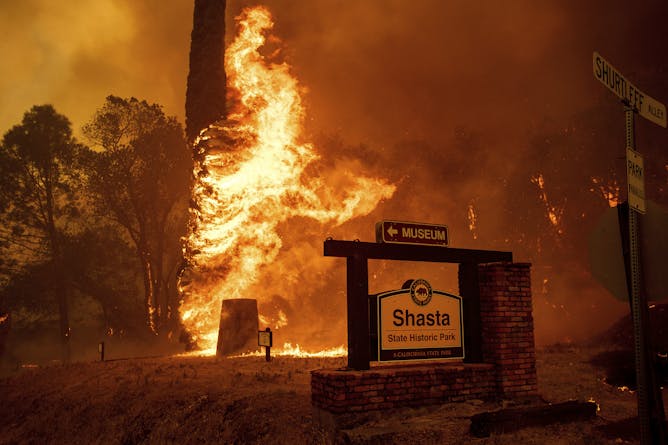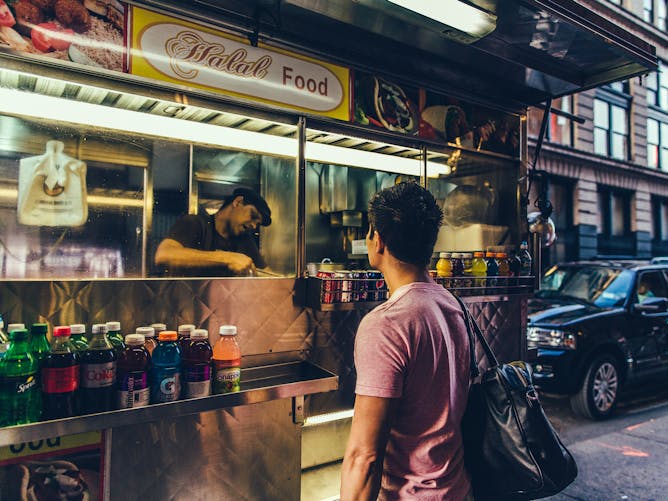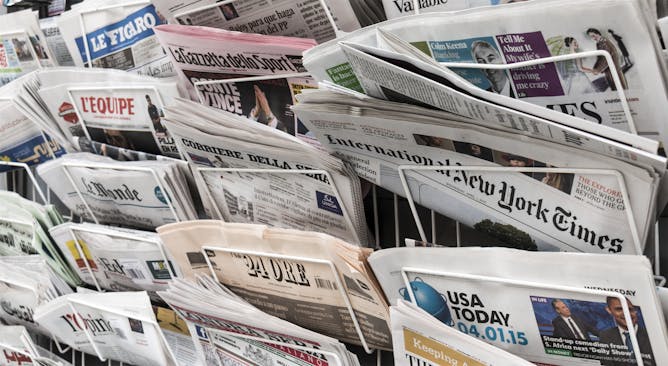Editor's note
|
|
The massive Carr Fire in Shasta County, California, has burned roughly 100,000 acres and is so large that it reportedly is creating its own internal weather systems. Dozens more major fires are also burning across the West. Cassandra Moseley, associate vice president for research at the University of Oregon, unravels the intertwined factors that are creating textbook conditions for large, complex and costly wildfires during an expanding fire
season.
When historians Febe Armanios and Boğaç Ergene were conducting research for their book, “Halal Food: A History,” they noticed that some Muslims had become more fixated on healthy, ethical eating. Interestingly, these Muslims had found inspiration for changing their eating habits in the Quran. Armanios and Ergene explore how this has led to shifting interpretation of what is and isn’t halal – and how the American
halal food market has responded.
In a Gallup survey, 45 percent of Americans said they believe the news is strongly biased towards a particular political party. But how biased is the media, really? One study found that Republican politicians received more than two times the mentions as Democrats in two leading newspapers, but media scholar Dominik Stecula explains why that statistic is not the best way to measure media bias.
|
Jennifer Weeks
Environment + Energy Editor
|

|
|
Top stories
|

The Carr Fire tears through Shasta, California, July 26, 2018.
AP Photo/Noah Berger
Cassandra Moseley, University of Oregon
Climate change, development, past forest management policies and current firefighting practices are creating conditions for large, costly wildfires.
|

For many non-Muslims, the fast food carts that line the streets of New York City and San Francisco are their primary point of contact with halal foods.
Guian Bolisay
Febe Armanios, Middlebury College; Boğaç Ergene, University of Vermont
The halal food sector largely relies on industrially produced meats and produce. But more and more Muslims are using the Quran to interpret halal to mean food that's wholesome and humanely raised.
|

It’s difficult to measure media bias.
Lawrey/shutterstock.com
Dominik Stecula, University of Pennsylvania
Nearly half of Americans say they see a great deal of bias in the news media. But the research on this subject is unresolved.
|
|
|
|
|
|
|
Politics + Society
|
-
Joseph Cesario, Michigan State University
Does it make sense to compare the percentage of black Americans shot by police to the percentage of black Americans in the population? A new analysis suggests a different way of looking at the data.
-
Adnan Rasool, Georgia State University
A constitutional change in Pakistan moved power and money from the federal government to the provinces. So newly elected Prime Minister Imran Khan takes office as the weakest leader in decades.
|
|
|
|
|
|
From our international editions
|
-
Geoffrey M Hodgson, University of Hertfordshire
The state plays a strategic role, but they are also driven by financial markets – not central plans.
-
Matthew Robert Anderson, Concordia University
A right-to-roam movement has never developed in Canada the way it has in the U.K. Here's how it could benefit Canadian society as a whole, including reconciliation efforts with the Indigenous.
-
Muchazondida Mkono, The University of Queensland
The Cecil movement didn't lead to any deep-seated changes as trophy hunting persists in many parts of Africa.
|
|
Today’s chart
|
-

 |
Erik C. Nisbet
The Ohio State University
|
 |
Olga Kamenchuk
The Ohio State University
|
| |
| |
| |
|
|